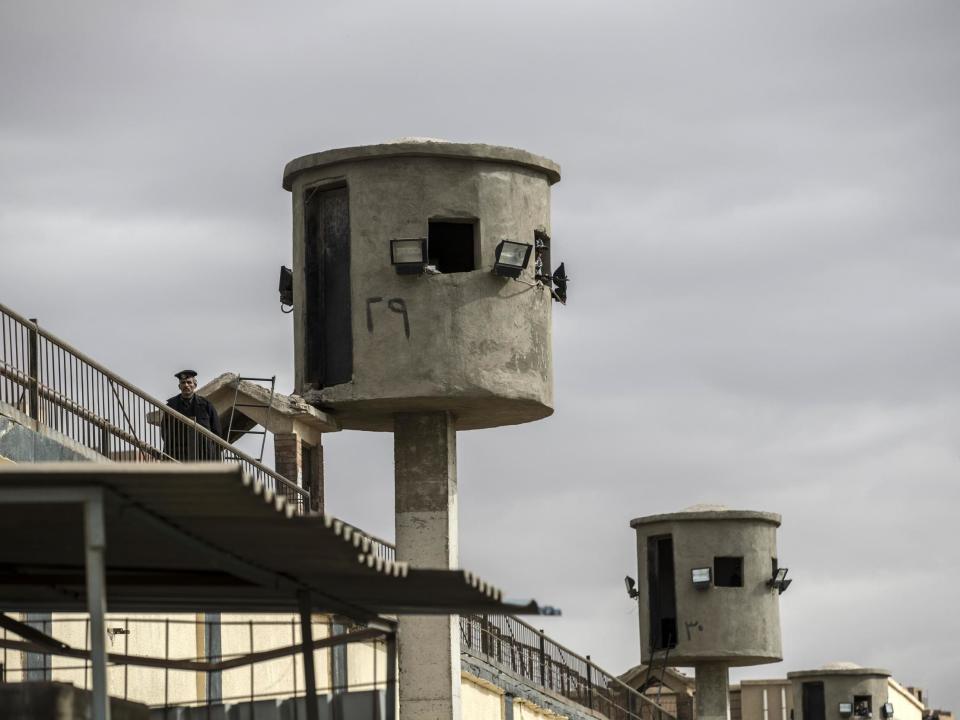So many people are sentenced and disappeared in Egypt, it’s a blur – yet the international community stay silent

I want a letter. This was the simple request written on a piece of paper by Laila Soueif, 64, an Egyptian professor and life-long human rights activist as she sat on the curb that licks around the blistering crucible that is entrance to Cairo’s notorious Tora prison.
The small and innocuous demand to hear from her jailed son Alaa Abdel-Fattah, 38, a software engineer and leading voice of the 2011 revolution, was too much for the Egyptian authorities.
Egypt had halted all prison visits since the outbreak of the coronavirus in March. It has worried many families particularly as the Geneva-based Committee for Justice reported that there have been Covid-19 cases present in nearly 30 detention centres across 10 governorates, including Tora prison.
Laila has regularly slept rough on the streets outside Egypt’s Chateau D’if waiting for the promised message to hear if her son was okay. Her two daughters, also human rights defenders, joined her.
They were taunted and goaded by the guards who stood by and watched a group of women armed with sticks badly beat them up and robbed them last Monday. When the three women tried to file a complaint, Sanaa, Laila’s youngest, was abducted by men in a van and eventually reappeared in detention herself, on charges of inciting terrorist crimes.
And so the vicious merry-go-round of abuse against the family continues. Alaa has been detained against every single of one Egypt’s presidents. This last stint he was arrested in September amid extremely rare anti-government protests.
His father, the late human rights lawyer Ahmed Seif al-Islam, was in jail when his sister Mona, another human rights activist, was born.
Alaa and Sanaa were both in jail, for separate cases when their father Ahmed died in 2014. Alaa himself was in prison when his son Khaled was born in 2011.
Laila was released on bail in March after being briefly detained when she staged a protest demanding prisoners be given better protections against the coronavirus. Award-winning Egyptian journalist Lina Attalah was arrested when she tried to interview Laila about what happened.
The ludicrous and bewildering cycle of arrests, trials, goes on in Egypt.
So many people are picked up, held in pre-trial detention, sentenced, disappeared, it become has blur.
It never makes the headlines or gets push back from the international community because it's awful but normal. This is the despite the fact that the UK is the single largest investor in Egypt and so could have the power to demand change.
Right now, the Association for Freedom of Thought and Expression (AFTE), one of the few groups trying to track arrests, say they honestly do not know how many activists are behind bars.
They do know at least 20 journalists are detained. Among them is Solafa Magdy, a freelance reporter who was detained in Cairo alongside her husband, Hossam el-Sayyad, and their friend Mohamed Salah, in November 2019 on charges of membership of a banned group and spreading false news.
Solafa’s family say they haven’t heard from her in four months. They have no idea if she is surviving the coronavirus.
Meanwhile, AFTE says separate to the arrests and detentions of activists and reporters, is a new worrying trend: the growing number of female Tik-Tok and social media stars imprisoned in the country on charges of being immoral.
Most recently on Sunday, prominent belly dancer Sama al-Masry, who was a staunch supporter of Abdel-Fattah al-Sisi, was sentenced to three years in prison and fined 300,000 Egyptian pounds ($18,500) for inciting debauchery and immorality for her social media posts including Tik-Tok posts.
Mawada Eladhm, who has three million followers on Tik-Tok was arrested on the same charges in May after she posted videos of herself dancing in shark onesie.
Haneen Hossam, another content creator and a second-year archaeology student, was arrested the month before and accused of prostitution after she tried to recruit people to work with her online.
There are many more.
But most of these arrests have gone unnoticed, unreported and that is helping strangle the remaining tiny space for free speech or justice in the country.
And so whether activists, journalists or Tik-Tok stars, it is imperative that the international community hold the Egyptian authorities to account. And that we write about it.

